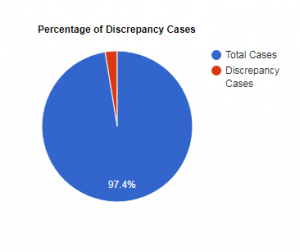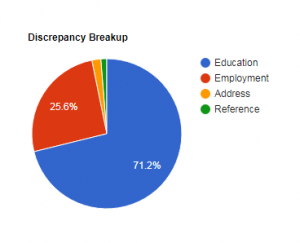
A new year brings new hopes, new resolutions and newer aspirations. As it’s often said, we should let bygones be bygones. This may work; however, in my opinion times gone by have their share of teachings for us. These teachings could also be called knowledge, experiences they come in the form of data, information, statistics, etc. They teach us a lot about what’s done, what could have been done better and what should be done to avert impending disasters. History is a kind teacher! Those who cannot learn from history are doomed to repeat it. We can learn from history, but we can also deceive ourselves when we selectively take evidence from the past to justify what we have already made up our minds to do, that too is a route leading to fiasco.
Let’s take a look at the year gone by and make a resolution of not repeating the follies of others. More and more companies are using the process of verification to ensure that the employee/ potential employee has not exaggerated their role or skills or experience. In most cases, firms are reaching out to specialized verification agencies such as ours to carry out these specialized services.
In the year gone by – 2.6% of the total cases handled by us had major discrepancies. 2.6% of the candidates misrepresented information to employers in 2017. Now this is frightening! To understand this further, let us elaborate the various kinds of discrepancies component wise:-
1. 71.2% of the cases had discrepancies in Education verification. Let’s face it; one of the most common aspects of falsification on a candidate’s resume is their education. Since many employers require job-related degrees or diplomas, many candidates may stretch their educational history in the hope that potential employers won’t check for discrepancies. An education verification check can ascertain not only weather the degree/diploma is fake or not, but also – the candidate’s degree/diploma/credentials, graduation or completion date, marks/percentage/CGPA and confirm the official educational accrediting body. Some candidates may have bought degrees or diplomas from companies commonly known as diploma mills. However, a reputable background screening company should be able to uncover these illegitimate degrees that aren’t worth the paper they’re printed on.
2. 25.6% of the candidates fibbed while furnishing their previous employment details. You gave a candidate the current profile on the basis of the previous employment. Now picture, a major discrepancy comes up in that! It’s going to be a mess! Confirming a job candidate’s past work experience is one of the most important background checks an employer can conduct. Looking into a candidate’s past work history can reveal insight into their job stability and loyalty to an employer. Employers should compare what a candidate claims on their resume with the actual information reported by a background screening company. Employment verification can confirm: Job start and end dates, titles held, salary, job duties, completion of exit formalities and rehire eligibility. Working with a leading background screening provider can help employers vet candidates that match the employer’s required work experience for the position.
3. 1.9% of the cases had major discrepancies in address verification – This is scary! Just imagine, the address a potential employee claims to be residing at, turns out to be false. The physical address is usually the first place an organization would look for an employee in case of any adverse happenings. Now visualize, in such a scenario, you realize the address furnished to you is incorrect! Deliberately, an incorrect address was furnished! What a soup you and your company could be in. Therefore, it’s important that the address related information of employees stored in your records is accurate, more so in context of countries like ours where there is no address repository per se.
4. 1.3% candidates fudged their references – Many employers check references as part of the hiring process. A reference check is when an employer contacts a job applicant’s previous employers/ supervisor, colleges and other sources to learn more about his or her employment history, educational background, temperament, efficiency and job fit. It involves talking to references to gain insight into an applicant’s skills, qualifications and abilities to do the job. The employer wants to confirm that the candidate has the right skills for the job and if he/she will fit in well within the organization.
The above mentioned data clearly reflects the areas of concern. So you as an employer/HR head/ recruiting manager or a supervisor need to learn from the year gone by and without fail get the above verification checks done. These checks are not only to be done for new hires by also for the existing workforce, contractors, trainees and vendors.
After all, one bad fish can spoil the whole pond and one rotten apple can upset the apple cart. One bad, overripe or mouldy apple really can cause all the other apples around it to spoil.
“What can I say? I hired the wrong guy and he destroyed everything I’d spent 10 years working for.”
These are the words of Steve Jobs, commenting on how he wrongfully recruited John Sculley as the CEO of Apple, which eventually caused Steve Job’s ouster from the very company he had started.
How much does a bad apple cost? Well I don’t know, but it sure upsets the apple cart! Not all damages are obvious and quantifiable. There are also some hard-to-quantify costs such as lower employee morale, productivity and customer dissatisfaction. Unsurprisingly, it is the ripple effect from these consequences that brings upon the most lethal damage.
So beware and play it safe!

